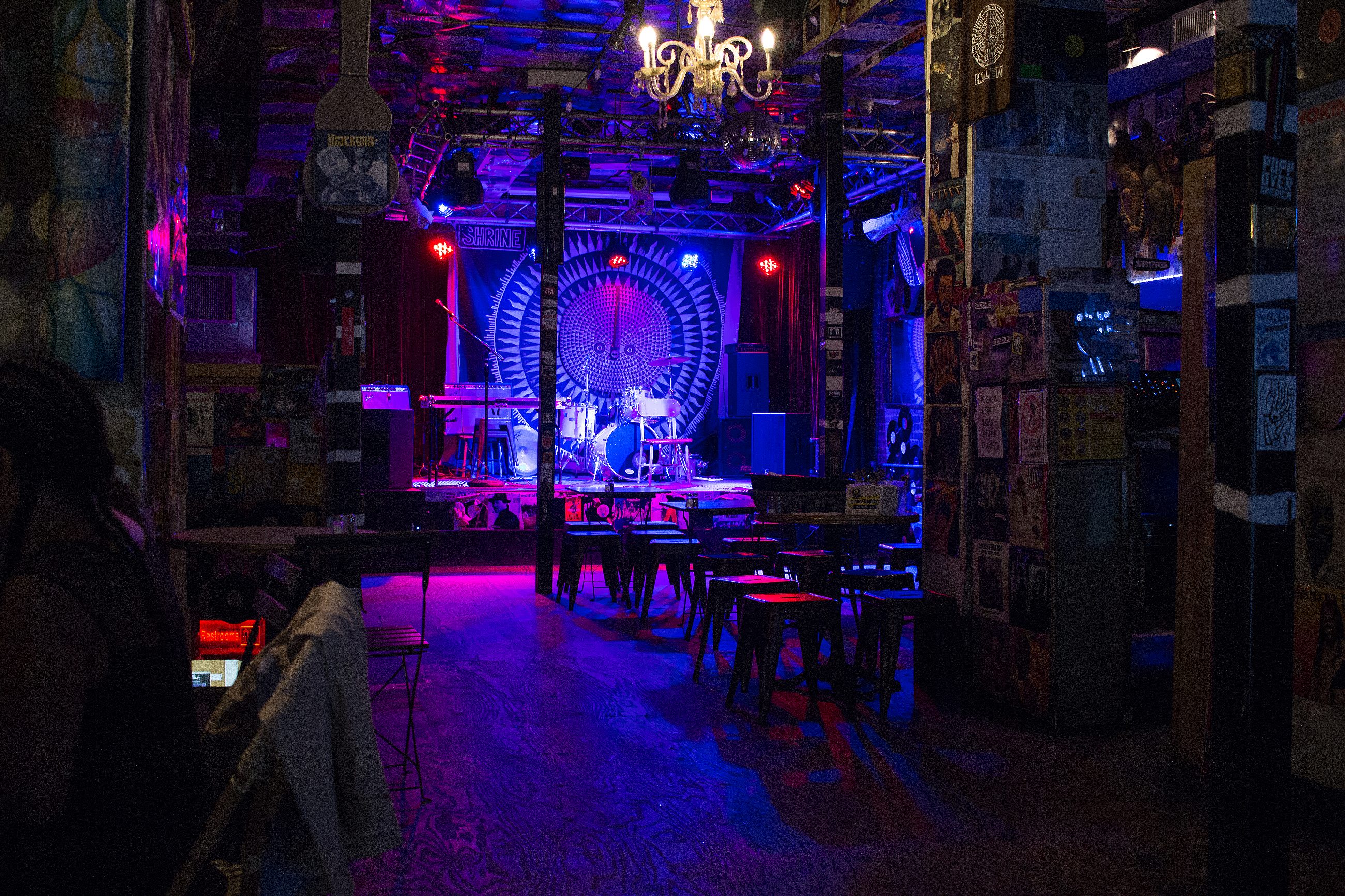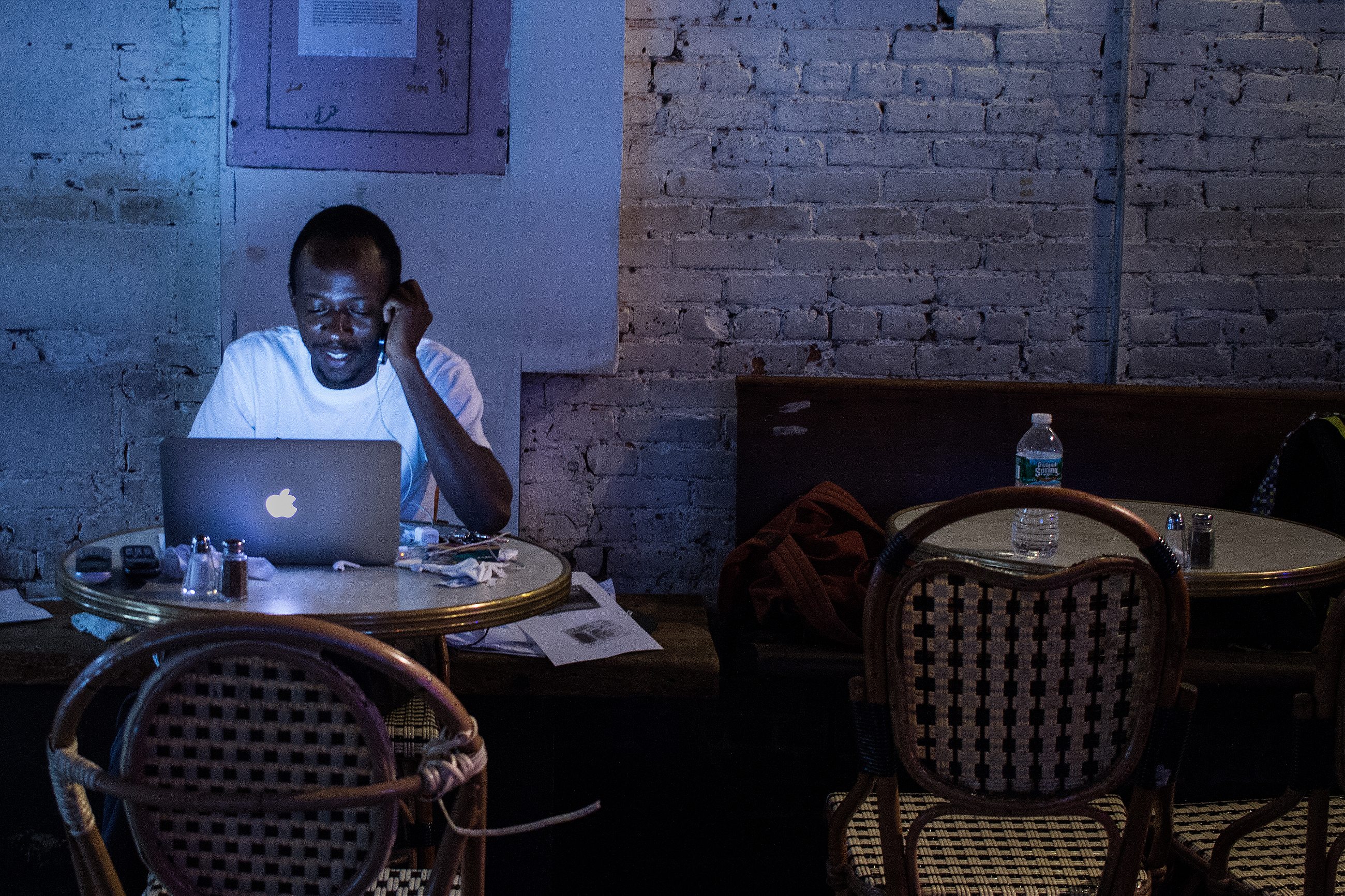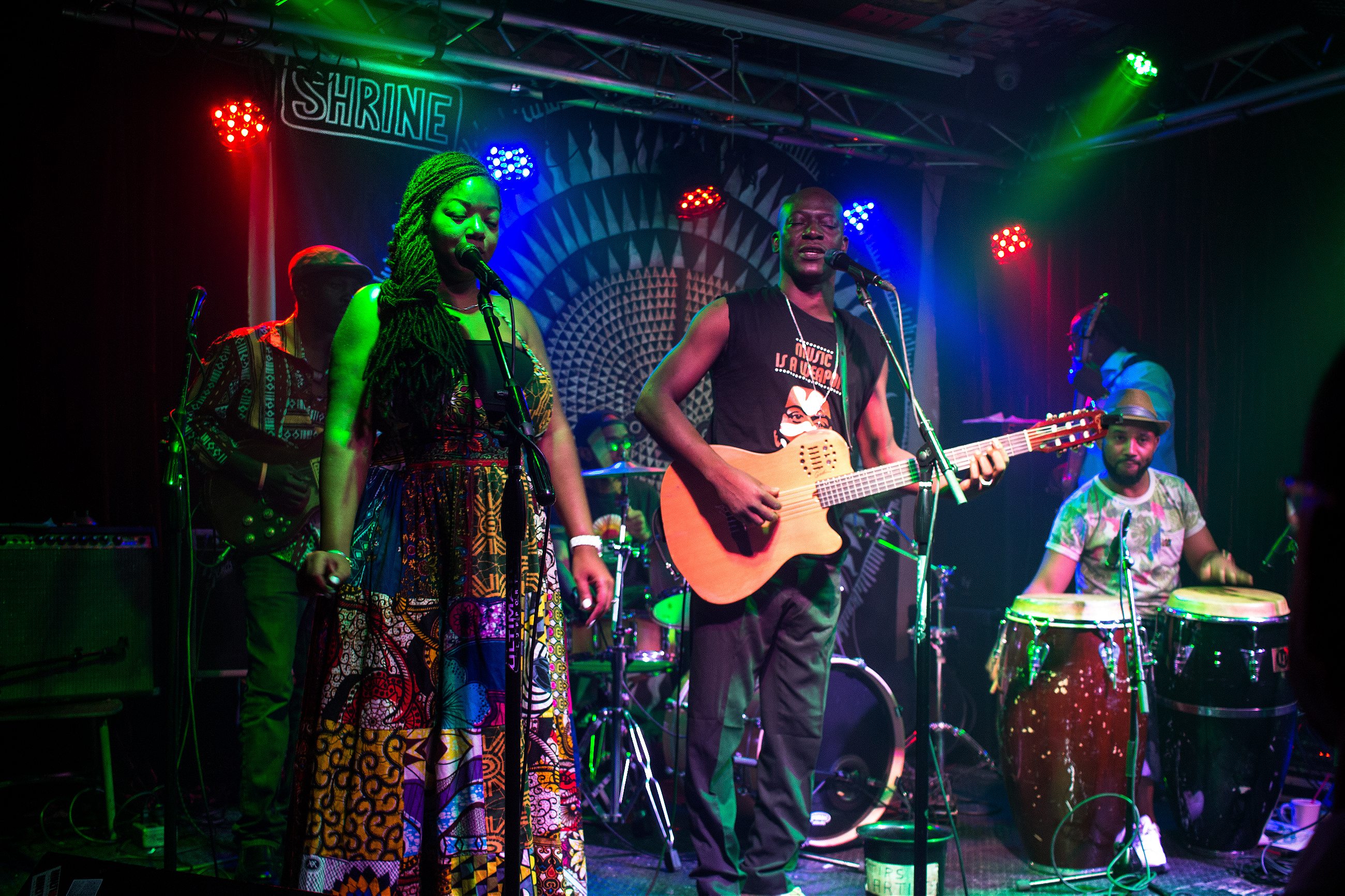In a club in Harlem, immigrants from the troubled nation Burkina Faso gather to talk politics and hip hop.
The walls inside The Shrine, a club on 134th Street in Harlem, are plastered with obscure eighties vinyl covers and West African animist paraphernalia. Huddled outside the front entrance are young men wearing snapbacks and Jordans chatting in French. The growing crowd files in through the narrow double doors in anticipation of tonight’s headliner: Bil Aka Kora the prodigal son of Burkina Faso, hot off the heels of his latest album.
The Shrine, established in 2007, is billed as a world music venue but serves as the premier hangout for New York’s small but growing population of expatriates from Burkina Faso. Founded by Abdel Gombraogo, The Shrine acts as their only point of cultural familiarity in a country that has never heard of theirs. And tonight, the staff warns me, the place will swell with Burkinabé, the name given to those that call the West African nation home.
Burkina Faso was briefly at the center of international news coverage in mid-October 2014 when Blaise Compaoré, the president of 27 years, was unseated in popular coup. It was under his rule that Burkina Faso became one of the most underdeveloped states in the continent, despite its vast mineral wealth. In recent decades tens of thousands of educated Burkinabés emigrated to France and America, with 6,000 settling across Brooklyn and Queens, many of whom have university degrees but few prospects. Compaoré’s ouster hasn’t resulted in the calm and change many desired; last week, just one month before elections, Burkina’s presidential guard overthrew the interim president.

Matt Soubéiga, the venue’s booking manager, is late. He arrives halfway through the opening act and sits next to me outside. Roughly 30 years old, Soubéiga is short and thin, with an unkempt mustache and a delicate handshake. He places his cracked iPhone next to him face up to keep track of a flurry of incoming calls and messages.
He moved to the capital, Ouagadougou, to study international public relations in 2001. He worked as the coordinator of a hip-hop music festival, drawing artists from around West Africa. In 2010 he landed a U.S. visa and in 2014, a job as booking manager at The Shrine in the hopes of furthering his career and providing for his family.
“Everything I do, I do for my family back at home,” Soubéiga says. He can now send back money to his parents and three brothers still in Burkina Faso, where the average income is about $48 a month. This chronic poverty was just one of the many grievances lodged against President Compaoré during violent clashes with police last fall. Compaoré had threatened to repeal a constitutional limit on presidential terms. Citizens, exhausted with Compaoré’s authoritarian rule, overran the streets, burning down parliament, and removing a nascent military dictatorship with assistance from the international diplomatic community.

Soubéiga got caught up in the fervor. In Harlem, he helped form Collectif Tekre, a rap collective, to rally against Compaoré. The group brought together figures in New York’s Burkinabé community that hadn’t met since they arrived in America. Under Compaoré’s rule, music was censored, so their group used their new freedom as part of the diaspora to preach for a peaceful revolution. Their single, Tekre, became the self-proclaimed anthem of the revolution and the group did interviews with BBC and Voice of America.
Large black Anvil cases housing keyboards and amplifiers are being unloaded from a white Transit van in front of The Shrine. Soubéiga runs between our table and the curb, phone in hand, orchestrating Bil Aka Kora’s arrival.
When things settle I ask him what kind of leader he would like to see replace Compaoré. He says he doesn’t have the answer. “Compaoré was in power for 27 years. He touched everyone in government. There’s no one left to trust.”
What the country needs, Soubéiga says, is another Thomas Sankara. Known as the African Che Guevara, Sankara is considered the father of Burkina Faso and a canonical figure of Marxist Pan-Africanism. He seized power in 1983 in a coup that brought down the French administration. In a matter of four years, Sankara instituted an impressive number of reforms, spanning from women’s rights to universal healthcare. “During the 2014 revolution, it seemed as if Sankara was alive again,” Soubéiga says.
But in 1987, Compaoré, who had helped Sankara overthrow the French four years earlier, murdered his former commander and 12 of cabinet members and seized power. He immediately set about reversing Sankara’s policies and an era of graft and corruption began. For almost three decades, speaking of Sankara was forbidden. His face did not appear on televisions and it was illegal to possess his photo.

Soubéiga leaves the table and goes inside to prepare the stage, but not before introducing me at a table of young Burkinabé. They wear clothes with American brands draped over their vividly colored dashikis. They speak in French on topics ranging from the blandness of American cuisine to West African hip hop.
When I ask how they feel about Compoaré’s ouster, the table falls silent. A young man named Benjamin, who refuses to give his last name, slides his seat over to mine. “We don’t talk politics outside,” he says. “It is not polite. You don’t know who is listening.”
The group, fresh from Ouagadougou, was still living in the shadow of Compaoré’s authoritarianism rule, even though they are at a venue known for its anti-Compaoré politics. Benjamin arrived in New York just three months ago. He studied international law in Ouagadougou, earning a master’s degree, and moved to Harlem shortly thereafter. Now he earns a meager living as a dishwasher in a Brooklyn restaurant, working seven days a week, trying to scrape up enough cash to pay for a graduate program in an American university.
But to some of the older Burkinabé, Benjamin’s move was a mistake. Nasser (a.k.a. Black Massa, or Masano Baba Cool), a member of Collectif Tekre moonlighting as a real estate broker in New Jersey, tells me later that it would have been better for Benjamin to stay in Burkina Faso and help develop West Africa.

Nasser arrived in New York equipped with little more than a middle school education. He found that America was a difficult country to negotiate. “What they don’t understand about America is that people struggle here every day,” Nasser says. “It’s not like on TV or the rap videos. It would be better for most graduates to stay in Burkina Faso then to trade years of studies with a dish washing life or low earnings. If you have the education, it’s best to stay in Africa. We need minds like Benjamin’s to develop our country.”
By this time, The Shrine is completely full. The blue and red lights wash out the entire room and the air conditioning is on full blast. Conversations ebb and flow in countless West African languages. Nike shoes are paired with boubous and women wearing kaftans hold Heinekens. Abdel, the owner, takes the stage in a Bob Marley shirt and bowler hat to introduce the man everyone has been waiting for.
Bil Aka Kora hops on stage carrying his classical guitar, supported by four local musicians and a Burkinabé backup singer. He opens the set with a hit off his new album, Vessaba. Though he sings in Kasséna, a language spoken by less than one percent of Burkinabé, the entire venue sings along. Over the next two hours Kora pumps out reggae tunes and power ballads, trading lyrics with the crowd, and for one night, the politics of home can be left at the door.